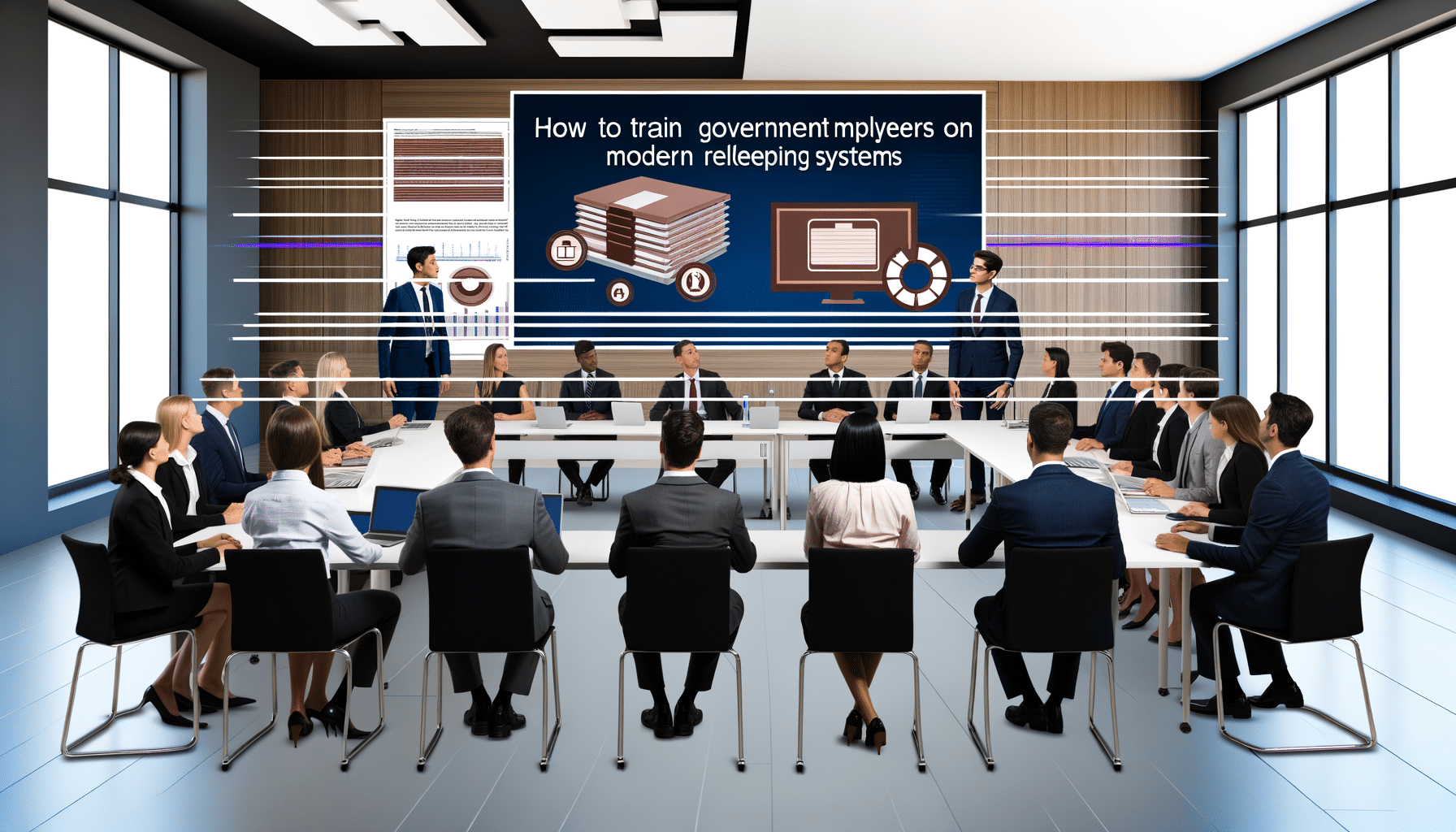- Training
- May 18, 2024
How to Train Government Employees on Modern Record Keeping Systems

Improving Government Systems: The Art of Training Employees on Modern Record Keeping
In today’s fast-paced digital world, the question isn’t whether to embrace technology, but rather how effectively we can integrate it into our processes. As a founder of RecordsKeeper.AI, I’ve closely observed that the inefficient management of records is a recurring challenge within government departments. Addressing this requires equipping employees with the necessary skills and knowledge for modern record keeping systems. By adopting a structured employee training program focused on record keeping, government entities can unlock unprecedented efficiencies and security.
Understanding the Need for Employee Training
When it comes to incorporating new record keeping systems, the importance of employee training cannot be overstated. Government entities, responsible for maintaining vast quantities of information, stand to gain immensely from advanced technologies like AI and Blockchain. However, even the most robust system is only as good as the people operating it. Training in this context serves to bridge the gap between potential and actual performance. A comprehensively trained workforce not only ensures efficient record keeping but also enhances compliance and data security. This relieves the pressure on employees, allowing them to focus on strategic tasks.
Designing an Effective Training Program
First and foremost, crafting an effective training program requires an understanding of the existing skill set of government employees. Tailoring content to fit the current levels of expertise guarantees that no one is overwhelmed or left behind. Here are some key factors to include in your training blueprint:
- Identify Key Learning Objectives: Establish clear goals that guide trainees through the essential functionalities and benefits of the system.
- Blend Theory with Practice: Incorporate hands-on sessions to ensure employees are comfortable with real-time system operations.
- Foster Collaboration: Encourage team tasks during training to build camaraderie and enable knowledge sharing.
- Include continuous learning: Create avenues for ongoing education through resources like webinars, support sessions, and internal forums.
Leveraging Technology for Enhanced Learning
Modern record keeping systems, including those facilitated by RecordsKeeper.AI, are intuitively designed to be user-friendly. Still, effective employee training must exploit the technology to its fullest. Here’s how:
Interactive Online Platforms
Online learning platforms can be extremely beneficial, offering a repository of training materials that employees can access at their own pace. Coupling these with interactive modules, like quizzes and scenario simulations, can significantly boost retention and understanding.
Live Demonstrations and Workshops
Organizing live demonstrations and workshops can provide a dynamic learning environment. Employees have the opportunity to see the system in action, ask questions, and clarify any doubts they might have. This kind of engagement is invaluable.
Utilizing VR and AR
While still in the nascent stages, Virtual and Augmented Reality present promising avenues for immersive learning. By simulating real-world scenarios, these technologies allow employees to practice skills in a safe environment, readying them for real-life record keeping challenges.
Reinforcing the Learning
The initial employee training phase is merely the starting point for mastering new record keeping systems. Continuous reinforcement is critical to ensuring that learning evolves into a well-rounded competence.
- Feedback Loops: Provide platforms for employees to give feedback on both the training session and system usage. An open feedback channel enables iterative improvements.
- Follow-Up Sessions: Schedule regular follow-ups to revisit system updates and address new queries. These refreshers aid in reinforcing initial training sessions.
- Recognition Programs: Develop initiatives that reward employees for completing training milestones or demonstrating exceptional mastery.
Realizing the Benefits
As government entities successfully navigate through the maze of implementing new record keeping tools, the anticipated benefits are striking. Not only do employees become proficient with advanced systems, but organizations concurrently achieve enhanced security and compliance, optimized workflows, and superior data integrity. For any department seeking to automate and modernize its records, the strategic advantage is substantial.
Conclusion
Training employees on modern record keeping systems involves more than a simple introduction to new technology. It requires a considered, multi-layered approach that empowers government staff to confidently harness new tools. As we evolve, let us navigate these transitions with foresight and optimism. If you’re intrigued by the potential of innovative record management, I invite you to continue exploring with me, Toshendra Sharma, and learn about how RecordsKeeper.AI is transforming the landscape of government and business administration.
Toshendra Sharma is the visionary founder and CEO of RecordsKeeper.AI, spearheading the fusion of AI and blockchain to redefine enterprise record management. With a groundbreaking approach to solving complex business challenges, Toshendra combines deep expertise in blockchain and artificial intelligence with an acute understanding of enterprise compliance and security needs.
Archives
- December 2024
- November 2024
- October 2024
- September 2024
- August 2024
- July 2024
- June 2024
- May 2024
- April 2024
- March 2024
- February 2024
- January 2024
- December 2023
- November 2023
- October 2023
- September 2023
- August 2023
- July 2023
- June 2023
- May 2023
- April 2023
- March 2023
- February 2023
- January 2023
- December 2022
- November 2022
- October 2022
- September 2022
- March 2019
Want to get more content like this?
Signup to directly get this type of content to your inbox!!
Latest Post
Organizing External Auditor Access
- December 22, 2024
Document Control in Manufacturing Plants
- December 21, 2024
Handling Rush Financial Report Requests
- December 20, 2024
Managing Record Access After Staff Changes
- December 19, 2024





